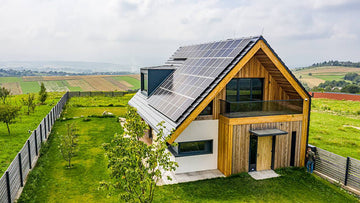Solar energy has become an increasingly popular choice as a new energy source, and inverters are an essential solar system component. As solar technology continues to develop, the wide range of solar inverter brands on the market expands your options. Suppose you consider installing a solar energy system for your home or business. In that case, you need to know a little bit about inverters, and we want to be able to answer all the questions you want to know about solar inverters.
What is a solar inverter?
One of the main functions of a solar inverter is to convert the direct current (DC) generated by the solar panels into alternating current (AC) to power electrical appliances and equipment or to feed back into the grid.
Maximum Power Point Tracking
MPPT technology helps solar systems maximize the output of solar panels under varying light conditions. By dynamically adjusting voltage and current, the MPPT algorithm ensures that the system operates at the maximum power point, improving system efficiency and performance.
Monitor PV array performance
Solar inverters typically have monitoring capabilities to monitor and manage the output of the PV array, including parameters such as voltage, current, and power, to ensure proper system operation and optimize performance.
Hybrid inverters
Many of today's inverters are hybrid inverters that convert DC to AC and AC to DC for battery charging. This type of inverter allows more functionality, such as energy storage and self-sufficiency, increasing the flexibility and reliability of the solar system.
See more: how does an inverter work?
Solar inverter types
String inverter
String inverters are the most common type of inverter used to convert DC to AC power from multiple solar panels connected in strings. It is ideal for sunny, constantly lit installations and is usually suitable for small to medium-sized solar systems. It is low-cost and easy to maintain but is not a good choice for shaded roofs. This is because a group of PV panels in a system connected in series can be affected by the same load and lose performance.
Micro Inverter
Unlike string inverters, microinverters are mounted independently on each solar panel or integrated into the solar panel. Because they are not interconnected, maximum power point tracking (MPPT) is more efficient for each PV panel in the system. Even if the other solar panels are shaded, each solar panel maximizes solar energy capture, increasing the system's efficiency and flexibility.
Power Optimizer
A power optimizer is a device between a string inverter and a microinverter. Like microinverters, each solar panel is connected to or integrated into an optimizer. The difference is that they do not convert DC to AC on the spot. The optimizer optimizes the output of each panel and sends it to the central inverter for conversion.
See more: How to choose between microinverters and string inverters?
Tips for choosing a solar inverter
To buy the right solar inverter, you need to determine what your purpose and needs are. Next, what are the criteria for choosing a brand? Figuring out these questions will make things easier.
Purpose of buying an inverter
- Power requirements: How much power do you need to produce? Determine the total power requirements of your solar system to ensure that the inverter you purchase will be able to meet your system's power requirements.
- Efficiency and cost: Consider the efficiency of the inverter; a high-efficiency inverter will make better use of solar energy. At the same time, weigh the price of the inverter against its performance and choose an inverter that will be cost-effective in the long term, rather than focusing only on the initial purchase cost.
- Monitoring: If you want to know the status and data of each solar panel, consider choosing an inverter with real-time monitoring. This will help you track, analyze, and optimize the historical performance of your system.
- Warranty: It is important to understand the manufacturer's after-sales service and support if you want to be able to get support promptly when repairs or maintenance are needed. Often a longer warranty also represents the manufacturer's confidence in the quality of the product.
Requirements for the inverter
- Fire regulations: Depending on the fire code requirements of some locations, inverters must have a quick shutdown feature in the event of a fire or other emergency.
- Overload protection: whether the inverter has an overload protection function to ensure that the system can automatically disconnect or reduce the output in the event of a current overload.
- Short-circuit protection: The inverter must be short-circuit protected to prevent damage or safety hazards if the circuit is short-circuited.
- Installation requirements: Determine the installation space to determine the size and dimensions, weight, etc. of the inverter. The inverter should be installed in a dry, well-ventilated location.
Criteria for inverter brand selection
The first is the exact location of the manufacturing company and where the product is manufactured. Some areas may have stricter quality standards and advanced manufacturing techniques that help ensure product quality and reliability.
Then learn about the key features of the product:
- Durability: Consider the inverter's durability and reliability, and choose a proven brand to ensure long-term stable operation.
- Intelligent features: Some inverter brands may offer features such as smart monitoring and remote control, which can improve the efficiency of monitoring and managing the system.
- Product range: Choose a brand with a wide range of products to suit different sizes and types of solar systems.
- Compatibility: Ensure the inverter brand's products are compatible with other solar modules and systems for flexible system assembly and upgrades.
- Customer testimonials: Some of the most relevant customer testimonials give the truest picture of how the product is used.
Finally, consider the level of technical support and the quality of the brand's after-sales service - you don't want to be faced with annoying after-sales problems, do you? Then choose the manufacturer with the best after-sales service!
Inverter brand comparison
| Pros | Cons | |
| TOPBULL |
|
|
| Enphase |
|
|
| Growatt |
|
|
| SolarEdge |
|
|
Among the above brands, our advantage lies in our excellent value for money. We offer good quality and efficient inverters at affordable prices.


















